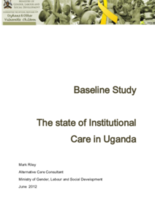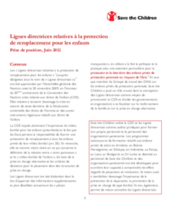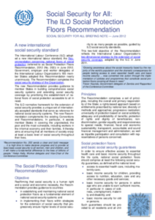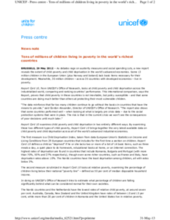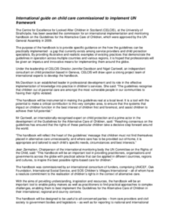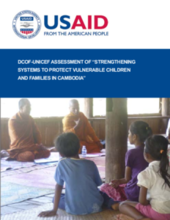Demographic Data
|
Sources: World Bank, UNDP, UNAIDS, DHS 2013 |
Displaying 12811 - 12820 of 14390
La présente étude réunit un grand nombre d’exemples de bonnes politiques et bonnes pratiques présentés lors de la journée de discussion générale du Comité des droits de l’enfant 2011 (DGD) sur le thème « Enfants de détenus ».
This document summarises the key findings of the project to-date and the current status of the child care and alternative care directory. It also outlines some key activities that need to be undertaken for the MoGLSD to start to address the issues outlined within the report. The MoGLSD has carefully evaluated the baseline study and after a number of consultations wish to put forward this document as a proposal to address the serious issues of children without parental care and the growing number of children’s homes.
Cette note d'orientation de Save the Children présente le contexte, les objectifs et les principes directeurs énoncés dans les lignes directrices pour la protection de remplacement des enfants. Elle explique également pourquoi la prise en charge familiale est le mode de protection de remplacement à preferer aux placement en institutions.
This International Labour Organization (ILO) document introduces a new international standard adopted in June 2012, the Social Protection Floors Recommendation, 2012 (No. 202), that provides guidance to member States in building comprehensive social security systems and extending social security coverage by prioritizing the establishment of national floors of social protection accessible to all in need.
This International Labour Organization (ILO) brief introduces a new international standard adopted in June 2012, the Social Protection Floors Recommendation, 2012 (No. 202), that provides guidance to member States in building comprehensive social security systems and extending social security coverage by prioritizing the establishment of national floors of social protection accessible to all in need.
This policy brief by Save the Children sets out the organization’s position on intercountry adoption, highlighting research findings and referring to international legal standards and good practices. Recognizing that intercountry adoption has played a role in allowing for abandoned, orphaned or children with disabilities to be raised in a loving family from another country, the organization stresses effective regulation to ensure it serves the best interest of the child and does not involve commercial or criminal gain, fraud, child trafficking, or the deception of the birth parents.
The Ministry of Gender Equality and Child Welfare (MGECW) of Namibia released the 2012 Foster Care Standards and Guidelines which are aimed to guide social workers and other service providers in recruiting, assessing, training, matching, supporting, supervising and monitoring foster care services. The Foster Care Guidelines assist in translating the Standards into day-to-day practices. These Standards and Guidelines with accompanying training manuals were prepared to strengthen supported family-based care for vulnerable and marginalized children.
As debates rage on austerity measures and social spending cuts, a new report reveals the extent of child poverty and child deprivation in the world’s advanced economies. Some 13 million children in the European Union (plus Norway and Iceland) lack basic items necessary for their development. Meanwhile, 30 million children – across 35 countries with developed economies – live in poverty.
The Centre for Excellence for Looked After Children in Scotland (CELCIS), at the University of Strathclyde, has been awarded the commission for an international implementation and monitoring handbook on the Guidelines for the Alternative Care of Children, which were approved by the UN General Assembly in 2009.The purpose of the handbook is to provide specific guidance on the how the guidelines can be practically implemented - a gap that currently exists among service providers and child protection specialists.
This report describes the outcomes of the joint DCOF/UNICEF visit to Cambodia to assess a three-year, DCOF-funded project on Strengthening Systems to Protect Vulnerable Children and Families in Cambodia.


